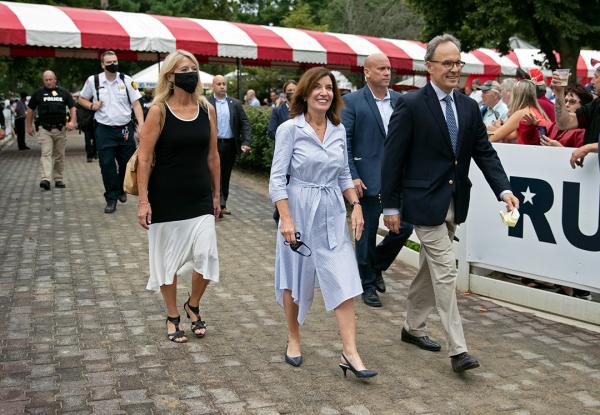Holy one by the plain language is not a coupled entry and you all can go to hell because there is only one even in fuzzy arithmetic
New York Gov. Hochul vetoes vetoes rule change regarding married jockeys & Easter Sundays & ny const art 1 sec 3
Matt HegartyOct 26, 2021
I-
Stop scratching on holidays
Published: June 1, 2012
Off Track Betting in New York State has been racing into a crisis called shrinking revenue. Some people have spitballed a solution: Don’t close on holidays.
New York State Racing Law bars racing on Christmas, Easter and Palm Sunday, and the state has ruled OTBs can’t handle action on those days, even though they could easily broadcast races from out of state.
“You should be able to bet whenever you want,” said Jackson Leeds, a Nassau OTB employee who makes an occasional bet. He added some irrefutable logic: “How is the business going to make money if you’re not open to take people’s bets?”
Elias Tsekerides, president of the Federation of Hellenic Societies of Greater New York, said OTB is open on Greek Orthodox Easter and Palm Sunday.
“I don’t want discrimination,” Tsekerides said. “They close for the Catholics, but open for the Greek Orthodox? It’s either open for all or not open.”
OTB officials have said they lose millions by closing on Palm Sunday alone, with tracks such as Gulfstream, Santa Anita, Turf Paradise and Hawthorne running.
One option: OTBs could just stay open and face the consequences. New York City OTB did just that back in 2003. The handle was about $1.5 million – and OTB was fined $5,000.
Easy money.

New York Gov. Kathy Hochul on Monday night vetoed legislation that would have removed a rule requiring married jockeys to be coupled in races for wagering purposes, citing the rule’s long history.
The rule, which is rarely invoked, became an issue in New York earlier this year when the married jockeys Trevor McCarthy and Katie Davis began riding together on the Aqueduct circuit. The rule states that horses in the same race ridden by married jockeys must be coupled, without exception.
Racing commissions across the U.S. used to have strict coupling rules on horses with shared ownership or financial stakes in order to guard against trainers or jockeys conspiring to alter race dynamics or impede other horses in favor of one part of the entry. In many jurisdictions, those rules have gradually been relaxed over the past several decades, especially in stakes races.
The coupling of the horses ridden by McCarthy and Davis in New York created some friction, in part because many other racing jurisdictions do not have such a rule on the books. Some critics called the rule outdated and “sexist.” Legislation to remove the rule passed unanimously in the New York legislature earlier this year.
But Hochul said in a message attached to her veto decision that the rule should remain in place.
“The rule applies neutrally to all jockeys, without regard to gender, and is intended to enhance the wagering public’s confidence in the integrity of a race,” she said. “Coupling of entries does not prevent related parties from participating in a race; rather, coupling of entries merely aggregates those related parties into a single betting interest in the race.”
However, the message also said that Hochul will ask the state racing commission to review the existing rule and seek input from racing constituencies in order to assess the “continued need for mandatory coupling and the circumstances under which such a requirement might be relaxed.”
No comments:
Post a Comment